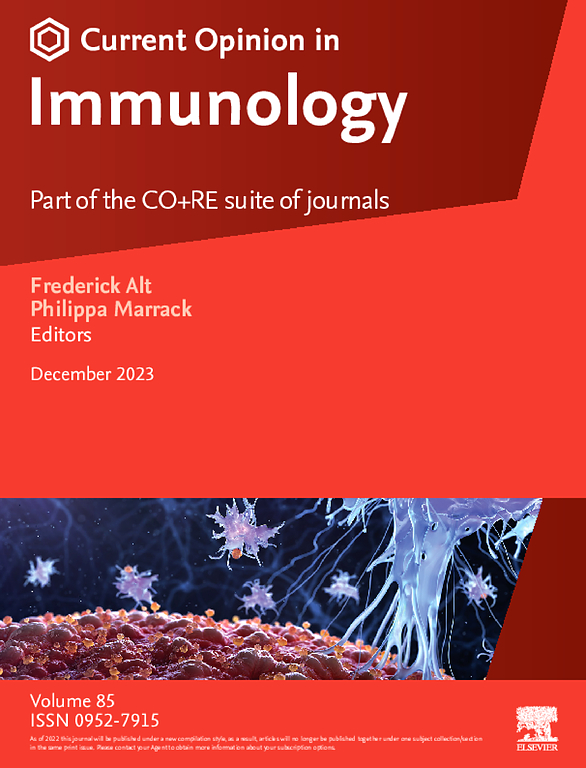Moving beyond the Janus kinase signaling kinases in the pathogenesis and treatment of psoriasis and psoriatic arthritis
IF 5.8
2区 医学
Q1 IMMUNOLOGY
引用次数: 0
Abstract
Psoriatic disease encompasses psoriasis and psoriatic arthritis. It is a chronic, progressive condition and leads to irreversible joint destruction. Conventional treatments used are disease-modifying antirheumatic drugs and biologics. Janus kinase (JAK) signal transducers and activators of transcription (STAT) cell signaling protein inhibitors have shown promising results in psoriatic disease. However, JAK inhibitors have been associated with some concerning safety issues, such as cardiac risks, venous thrombotic episodes, malignancy, and infection. There are other developing molecules beyond JAK inhibitors, such as tyrosine kinase 2 (TYK2) inhibitors, RAR-related orphan receptor gamma (RORγ) inhibitors, mammalian target of rapamycin inhibitors, nerve growth factor inhibitors, and STAT kinase inhibitors. In this narrative review, we have discussed such molecular targets beyond JAK inhibitors to examine their role in the treatment of psoriatic disease. This review discusses the potential of these new options, particularly TYK2 inhibitors, which is already Food and Drug Administration approved for psoriasis. These advancements offer promising options for the management of psoriatic disease.
超越Janus激酶信号激酶在银屑病和银屑病关节炎的发病和治疗中的作用
银屑病包括银屑病和银屑病关节炎。这是一种慢性进行性疾病,会导致不可逆的关节破坏。使用的常规治疗方法是缓解疾病的抗风湿药物和生物制剂。Janus激酶(JAK)信号转导和转录激活因子(STAT)细胞信号蛋白抑制剂在银屑病治疗中显示出良好的效果。然而,JAK抑制剂与一些安全性问题相关,如心脏风险、静脉血栓发作、恶性肿瘤和感染。除了JAK抑制剂之外,还有其他正在发展的分子,如酪氨酸激酶2 (TYK2)抑制剂、rar相关孤儿受体γ (RORγ)抑制剂、哺乳动物雷帕霉素靶点抑制剂、神经生长因子抑制剂和STAT激酶抑制剂。在这篇叙述性综述中,我们讨论了JAK抑制剂以外的分子靶点,以检查它们在治疗银屑病中的作用。这篇综述讨论了这些新选择的潜力,特别是TYK2抑制剂,它已经被美国食品和药物管理局批准用于治疗牛皮癣。这些进步为银屑病的治疗提供了有希望的选择。
本文章由计算机程序翻译,如有差异,请以英文原文为准。
求助全文
约1分钟内获得全文
求助全文
来源期刊
CiteScore
13.30
自引率
1.40%
发文量
94
审稿时长
67 days
期刊介绍:
Current Opinion in Immunology aims to stimulate scientifically grounded, interdisciplinary, multi-scale debate and exchange of ideas. It contains polished, concise and timely reviews and opinions, with particular emphasis on those articles published in the past two years. In addition to describing recent trends, the authors are encouraged to give their subjective opinion of the topics discussed.
In Current Opinion in Immunology we help the reader by providing in a systematic manner: 1. The views of experts on current advances in their field in a clear and readable form. 2. Evaluations of the most interesting papers, annotated by experts, from the great wealth of original publications.
Current Opinion in Immunology will serve as an invaluable source of information for researchers, lecturers, teachers, professionals, policy makers and students.
Current Opinion in Immunology builds on Elsevier''s reputation for excellence in scientific publishing and long-standing commitment to communicating reproducible biomedical research targeted at improving human health. It is a companion to the new Gold Open Access journal Current Research in Immunology and is part of the Current Opinion and Research(CO+RE) suite of journals. All CO+RE journals leverage the Current Opinion legacy-of editorial excellence, high-impact, and global reach-to ensure they are a widely read resource that is integral to scientists'' workflow.

 求助内容:
求助内容: 应助结果提醒方式:
应助结果提醒方式:


